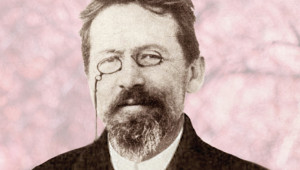Time and The Mystery of the Broken String
One of the most important stage directions in theatre history appears in Anton Chekhov’s THE CHERRY ORCHARD. It is the middle of Act II and the characters have assembled in an open space near an abandoned chapel. Madame Ranevskaya has delivered a revelatory monologue about her past, in which she recounts the punishments she has received for her sins—a fate that includes a husband who drank himself to death with champagne, then love on the rebound with a cruel younger man, and—most painfully—her little boy drowning in the river.
The former tutor of the lost child, Trofimov, counters with a speech about human progress. Lopakhin discusses his business, Yepikhodov strolls by playing his guitar, and Gayev gushes about the setting sun. “Oh wondrous nature, cast upon us your eternal rays, . . .” Varya and Anya plead with him to stop. Spoofing Gayev and his pool-playing references, Trofimov quips, “We’d rather have the yellow ball in the side pocket.” They all sit in silence, except for the mumbling old servant Firs.
And then . . .
Suddenly a distant sound seems to fall from the sky, a sad sound, like a harp string breaking. It dies away.
Much has been written about the symbolism of the broken string and how important it is to gaining access to Chekhov’s dramatic work. That the sound seems to fall from the sky, precipitation-like, a singular note of portent—gives credence to its cosmic relevance in the world of the play.
Madame Ranevskaya asks, “What was that?” and shivers and grows nervous. Lopakhin’s theory that the sound is an echo from a faraway mine shaft speaks to his bent to exploit nature for monetary gain. Gayev ventures that the sound came from “some kind of bird . . . like a heron” fixing it within a pastoral context. This is trumped by the eternal student Trofimov hearing it as the cry of another bird, the more intellectual owl. The elderly Firs chimes in and then adds scope. “It’s like just before the trouble started. They heard an owl screech, and the kettle wouldn’t stop whistling.” Gayev asks Firs, “Before what trouble?” and the old man answers: “The day we got our freedom back.”
Firs is referring to Czar Alexander II’s emancipation of the Russian serfs in 1861 and the shift away from the feudal system. A view commonly held by scholars is that “broken string” results from the tension created by the older more-natural order (as symbolized by the setting sun, screeching owl, and Ranevskaya’s tragic river) and a newer more man-made order (yellow ball in the side pocket, whistling kettle, and the arrival and departure of Ranevskaya and Gayev by train that frames the story).
The tension between the infinite and the finite, between the natural and man-made order, begins in THE CHERRY ORCHARD with the play’s first line. Lopakhin’s opening words are: “The train’s finally in, thank God. What time is it?” From here Chekhov created a play of astounding temporal complexity. Four acts later he underscores his breaking-string effect by repeating it in the play’s conclusion, the final stage directions.
Ranevskaya’s estate has been sold. Firs discovers that he is locked out. The eighty-seven year old servant, a human timepiece and representative from a bygone era lies down on the front porch. He very possible dies. The distant sound occurs, in this instance, just before the quiet that precedes the sound of an ax cutting a cherry tree.


Recent Comments